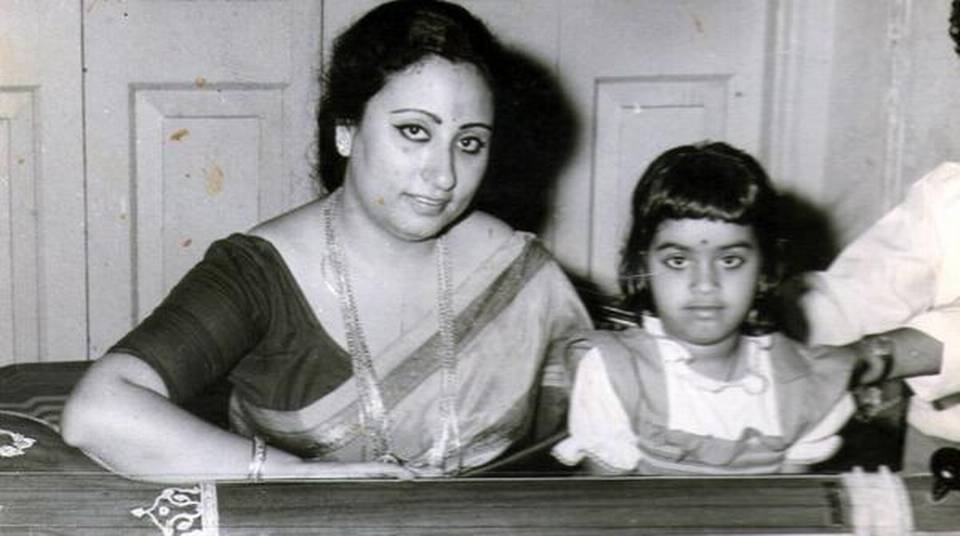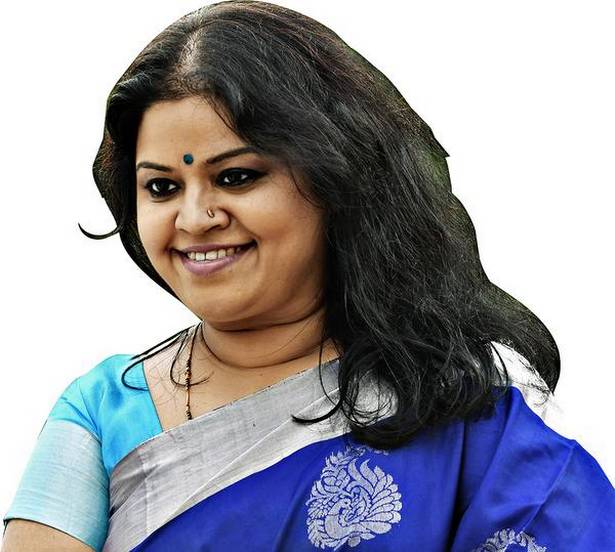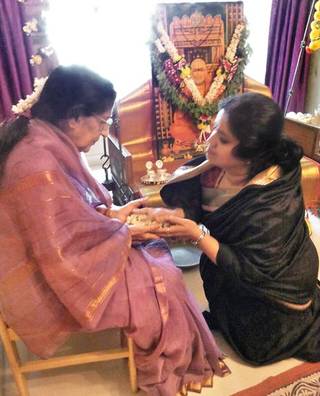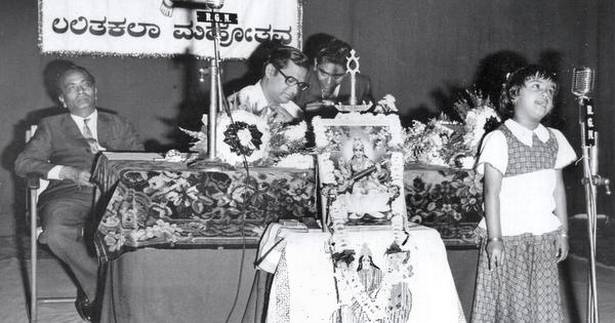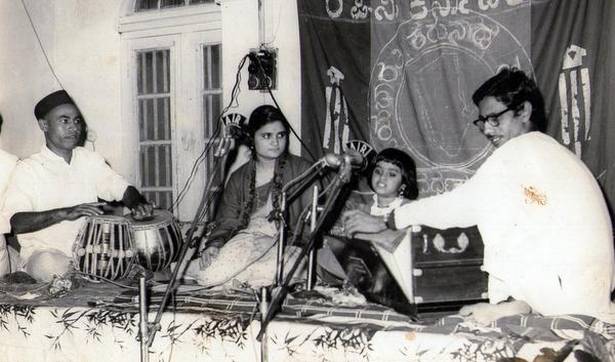I am willing to sing any genre of music, says the acclaimed musician, Sangeeta Katti Kulkarni. But, it will come with my touch, the knowledge that my gurus have given me, she explains on the eve of Guru Smaran
Sangeeta Katti Kulkarni needs no introduction. The Kannadigas love her voice, her style and the manner in which she captures every musical temperament through her euphonious voice. It could be a piece of classical music, bhavageethe, a folk song, or a film song — Sangeeta sings with a natural grace. When she sings the great poet Bendre, it almost feels like he wrote in consultation with Sangeeta — the song and singer sound inseparable. Hailed as a child prodigy, Sangeeta has worked with leading film composers and singers, has travelled widely and has been showered with awards in her four decade journey. A trained classical musician, there is the unmistakable classical music streak in every song that she sings. Trained by three great masters of music, Sangeeta pays them her tribute to through Gurusmaran, in Bengaluru on Sunday. On the eve of this programme, the singer shares her musical journey and the times she spent with her teachers. Excerpts from the interview.
It is a good place to be in music today. There are a flood of opportunities, and all kinds of musicians thrive in this ecosystem. It is difficult however, because ‘new’ seems to be the buzzword. Everyone is under pressure to do something new, constantly. A serious musician is thinking, rethinking, reinventing and evolving in his music, but this environment asks for visible change. How does it feel to be a musician at this time?
How many times I have felt that I should have been born in the 40s or 50s! Or I should have been born when my children were born. I was born in the 70s, and have, on many an occasion felt it was not the best time to be born. But then, it was indeed the best time to be born. I got to see the best of both worlds.
Till I entered college, technology was not such a huge presence. In the later years, it became one of the biggest forces, and things began to change rapidly. By the time you grappled with it, it would change again. Gramophone, radio, cassettes – all these lingered around for a good length of time. But once this phase was over – things just flew. MP3, pen drive, now MP4… it was too fast. Recording technology changed hugely. This had a bearing on how we thought and conceived music.
How did you cope?
My learning, school, my upbringing, my gurus… they exposed me to a solid learning process. I had a wonderful time. Facing this constant change was naturally difficult. What’s happening? I wondered so very often. Each time, it took me a while to make some sense of it.
This changing aura — where there is no aura — was hard on musicians like me. I’ll tell you why. We were still under the tutelage of our gurus and our thinking, the values of music, sensibility, belonged to another time zone. Gurus were the pivotal force of our lives. But for them, we would have been washed away in this flood. This commercial world would have sucked us. Their moral force, that made a home in us, gave us the ability to recognize the right things. The world outside was moving in real time. That did make it stressful. If I were born in 40s or 50s then this problem would not have been there! (laughs)
With all this, having seen both worlds, we are the watershed generation. We have to balance, keep the equilibrium.

So it is indeed a balancing act? It is about keeping two worlds together.
In the Nineties, I was singing for Kannada films. And within a year, I had sung for 25-26 films. I was quite a phenomenon then; a Dharwad girl suddenly taking on the Kannada film music scene and singing for all the top film banners, it was no mean achievement. It was during this time that my guru, Basavaraj Rajguru passed away. Then I met Kishori Tai, on listening to me, she said: ‘Building is ready, but finishing is to be done.’ She asked me to take lessons from her. I had established myself as a playback singer, my future had a lot of promise, but without any second thoughts I dropped everything and went to her. I stayed with her for four-five years. In her company, and in her guidance, I used to forget this world. If that is the choice I made, then don’t I have a huge responsibility? It is challenging to keep traditional values in this changing world, but I will do it. I believe in it. Even if I am singing contemporary music, I make an effort to bring the values that all my gurus inculcated in me.
The musicians of yesteryear had a different understanding of time. When you impose those values on present time, what are the repercussions?
Today we are in an ‘instant’ world. But raga is not instant business. Nevertheless, you have to strike at something ‘instant’ that will keep the mind and interest of today’s listeners. It is a challenge. Hindustani or Carnatic music is not the only music that has tradition. Folk and jazz have traditions of their own, in fact every form of music does. To convey this, it requires a lot of perseverance and patience. It is difficult because the engagement they have with music is not very deep. For instance, let us take a popular number. It is not about how someone has sung the song, it is about the thought that has gone into it. So how do you convince and convey this to your listener? One keeps trying, hoping that atleast five in a 100 will get it. Music is all about essence.
There are any number of stories from the past on how a Shuddh Kalyan was taught for six years. That in ten years only five ragas were taught, etc. But today, the idea is to spread wide than to dig deep. Your success is counted on the number of things you can do, and how soon you can make it. Where do you find your sthayi?
My sthayi is in the world of seven notes. I have no taboos, and my gurus didn’t have it either. Anything melodious, irrespective of style and genre is fine with me. I just love to sing. Afterall, it is about touch and the perspective you bring to the song. Last week, I sang a song for composer Vasuki Vaibhav. I sang twice, but I felt I could do better. I called and asked him to give me one more chance. I do take longer than others to finish a song, but that is because I am trying to explore its possibilities. I am trying to seek something more than the tune that is given to me. I feel every musician should be keen to push beyond the words and the tune. I think of some khatka, a gamak, a murki or an alaap.. I try to add value. Anyway, the good thing is that there are still some people who understand why I like to take time. I keep thinking of my music and that is where I belong.
There was Lata Mangeshkar, Suman Kalyanpur, P. Susheela, S. Janaki… all singing in the same era, but so different in their musical narratives. Now, every one wants to sound like Shreya Goshal, or an Arijit Singh. So is today all about sounding like someone?
Today there is too much emphasis on what sells. So if something succeeds, they want everything else to sound like that, and look like that. Music is now an industry in its complete sense. Nobody asks questions these days.
So will a take it or leave it attitude work today?
I don’t know…. Music to me is divine. I fail to explain the feelings that arise in me. I want to impart this knowledge that I have learnt from my gurus. My gurus were remarkable human beings. They believed in sadhana and said fame is ephemeral. You have to enjoy the process, music is not moving from one point to the other.
Kishori Tai never allowed us to make notes. Now, she was extraordinary, but it is not the same about her disciples. Her classes would be so loaded with knowledge that I would be dying to make a note of every word she uttered. So when she slept in the afternoons, I would retreat to a corner and quietly make notes. One day, she caught me doing it. She looked at me for a moment, said, “Good” and walked away. (She shows me the notes she made that day ten years ago. It is a lesson in Rag Malhar. Sangeeta sings and demonstrates how Kishori Tai explained it to her.)
I know what a guru is, I have experienced that bliss. I want to keep all those moments alive in me, always. I will sing what is beautiful and truthful, and there are people who know my worth.
You had three gurus. Pt. Puranikmath who was very subdued, Pt. Rajguru who was so evocative, and Kishori Tai, flamboyant and radical.
It was Puranikmath sir who took me to Pt. Rajguru. He said you need someone who knows better than me. Can you believe a teacher saying that? Dandapur sir, who taught me my initial lessons was also a picture of humility. When I think about them, I am filled with gratitude. There is so much to learn from each of them. I was a little girl and they pampered and nurtured me. Katigeri sir used to come late evening, by which time I would be tired after a full day at school, homework etc. He would suddenly switch to English, ‘only six lines, come let’s do it,’ he would coax me.
Once I was at Pt. Rajguru sir’s home for class. He told me he was busy with other students. I got upset and began to cry. He was flustered. ‘Why are you crying?’ he asked. ‘You don’t love me like you love your other students,’ I told him, crying more. He disappeared for about 20-25 minutes, and I sat there unable to stop crying. He came back with a plate full of piping hot upma and green gram unde.‘First you eat this. Don’t cry dear, I am here to teach you…’ How can I forget all that? A man of his stature needn’t have done it. But they were all exemplar human beings. Kishori Tai was unsparing, she made very high demands of her disciples. I have not seen a musician like her — totally committed.
Until Pt. Rajguru was gone I didn’t realise the seriousness; till then I got everything very easily. The actual learning process began when I went to Kishori Tai. She was such a perfectionist. Nothing would please her.
It has never been easy for women in the arts. Whether it is Begum Akhtar, Kishori Tai or anyone. There are just too many social baggages.
My father wanted me to become a musician, and he was the one who made Sangeeta Katti who she is. But it is still a very male-oriented world. Women have too many responsibilities to fulfill. If in the latter half of a woman’s life art has to be keep alive, luck plays a huge role.
Surbahar presents Guru Smaran – 2019. The Surbahar Puraskar – 2019 goes to Pt. Rajeshwar Acharya, Varanasi. Special Felicitation to Pt. Anantachar Katageri Dasaru, Dharward. There will be performances by both award winners. A vocal-violin duet by Sangeeta Katti Kulkarni and Milind Raikar to follow. Venue is Canara Union, Malleshwaram, Bengaluru, 5 p.m.
source: http://www.thehindu.com / The Hindu / Home> Entertainment> Music / by Deepa Ganesh / July 25th, 2019
